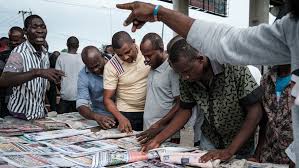APA – Lagos (Nigeria)
The naira fell to a record low of N1,400/$ at the parallel market on Thursday despite recent efforts by the Central Bank of Nigeria to save the national currency.
With continued dollar scarcity plaguing the country, Bureau de Change Operators confirmed to The PUNCH that the naira touched new depths in the foreign exchange market.
A BDC operator at Sheraton Hotel, Abuja, Usman Ibrahim, said, “For today, one dollar is N1,400 but if you don’t buy it today, I cannot assure you of the same price tomorrow. I also buy at N1,390 to a dollar.”
Another operator, Abubakar Taura confirmed that the naira depreciated further to N1,400 to a dollar.
He stated, “As of today, the dollar has gone up. It now sells for N1400/$.”
According to the BDC operators, there is currently uncertainty as regards the price of the naira against the dollar due to high demand.
On the official Investor and Exporter window, the naira depreciated by 2.12 per cent to N900.96/$ from the N882.24/$ it closed on Wednesday. Transactions opened at N929.18/$, rose to a high of N1,399/$, and recorded a low of N789/$. Total FX turnover was $115.19m, a 103.52 per cent increase from the $56.60m that was recorded on Wednesday.
The newspaper says that Nigeria’s Special Economic Zones have attracted over $66bn in Foreign Direct Investments and N620bn in Domestic Direct Investments.
The Chairman of the Nigeria Economic Zones Association, Nabil Saleh, disclosed this at the association’s annual general meeting on Wednesday in Lagos.
He said the investments had led to the creation of 35,000 direct and indirect employments, driving socio-economic development in the country.
Giving the sectoral breakdown of the investments, he said the manufacturing sector led with 45 per cent of the total investments, followed by the service sector at 30 per cent.
He added that the oil and gas sector accounts for 11 per cent of investments while the trading, logistics, and agriculture sectors also made significant contributions.
According to Saleh, the establishment of SEZs in Nigeria has led to the development of Africa’s biggest oil refinery, a deep sea port with the capacity to handle around 6 million twenty-foot equivalent units of containers, a gas processing hub along the Atlantic Coast and an oil and gas downstream manufacturing hub, among others.
The Guardian reports that the Nigeria Labour Congress (NLC) has alleged that the economic policies of President Bola Tinubu’s administration are largely driven by neoliberal principles, driven by World Bank and the International Monetary Fund (IMF), which are deforming the nation’s economy.
Calling for a holistic overhaul of the policies to make them more effective and sustainable, the congress said while some measures might attract foreign investment and provide immediate fiscal relief, the policies, most times, come with significant adverse socio-economic consequences.
NLC President, Joe Ajaero, said this, yesterday, in a paper, titled: ‘Tinubu’s Economic Reforms in Nigeria: Assessing Gainers and Losers’, presented at the 21st Daily Trust Dialogue, in Abuja.
While urging government to review some of its policies and seek creative ways to reduce the hardship on poor Nigerians, he warned that any reform that did not deliberately reduce the cost of governance in Nigeria by at least 50 per cent was deceptive.
According to him, reforms are expected to produce better results or outcomes for the people and if not, it becomes a deformation.Stating that reforms were ostensibly designed to address perceived fiscal challenges and promote economic sustainability, Ajaero, however, said the policies implemented have been met with mixed reactions, with both positive and negative consequences for different segments of the population.
He said: “Any policy that awards humongous benefits to those in government, allocating scarce public resources to live in opulence, build mansions, buy luxurious cars, treat themselves abroad while Nigerians die over common ailments in hospitals here, maintain long convoys, receive prayer alerts and all manner of spurious allowances while our people can barely scratch a survival can only be summarised as voodoo.
The newspaper says that the Nigerian Government has guaranteed absolute media freedom to practitioners but wants them to be truthful and responsible in their work.
The Minister of Information and National Orientation, Alhaji Mohammed Idris, made this known during his remark at the 21st annual Daily Trust Dialogue on Thursday in Abuja.
The dialogue with the theme “Tinubu’s Economic Reforms: Gainers and Losers” was organised by the Media Trust Group.
”I have participated in about half of the Daily Trust annual dialogues since inception. The Media Trust is one of the most responsible media organisations in the country.
“I have followed their trajectory from day one. I think that Media Trust has done so much for the country. I think that sometimes they take too much editorial liberty, but overall I think they have done so much like other newspapers in the country.
“I want to commend President Bola Tinubu. The fact that we are having this conversation here indicates that the Nigerian Press is indeed free.
“Without press freedom, democracy will not strive, and of course Tinubu understands that and that is why since assumption to office nobody has been gagged or question about their media spaces .
“And like I always say, press freedom or freedom of expression most times should not make you irresponsible. You cannot have freedom and not be responsible.
“It is important that whatever and whenever we report, we should say it truthfully, honestly and transparently. As a Minister of Information, I am telling Nigerians that am going to say it as honestly and transparently possible.
GIK/APA


